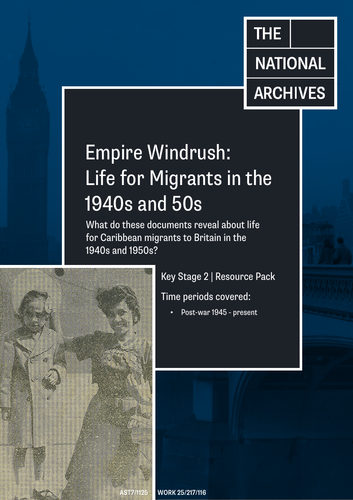

What do these documents reveal about life for Caribbean migrants to Britain in the 1940s and 1950s?
When the Second World War ended, countries needed to recover and rebuild.
By 1948, the Nationality Act was passed which gave people from the Commonwealth the right to live and work in Britain if they wanted. They were citizens of the ‘United Kingdom and Colonies’. Many Caribbean men and women had served in the forces during the war, some wanted to re-enlist into the armed forces or find other employment. After the war, Britain needed people to fill jobs in the health service, transport system and postal system.
Britain also used the European Voluntary Workers (E.V.W.) scheme to cope with its shortage of workers. The plan aimed to provide jobs in factories and farming to people from Europe who had been made homeless after the war. At the same time, many people also left their homes in the Caribbean to live and work in Britain. Those on the E.V.W. plan who were classed as ‘aliens’, however those from the Caribbean were ‘Citizens of the United Kingdom and Colonies’.
Housing for the new migrants, near to their places of work was often provided by National Service Hostels Corporation. At the Causeway Green Hostel in the West Midlands in August 1949, for example, there were 235 Poles, 18 E.V.Ws, 235 Southern Irish, 50 Northern Irish, 65 Jamaicans, and 100 English, Scottish and Welsh.
Finding accommodation became difficult for many commonwealth immigrants because of growing prejudice and discrimination in the 1940s and 1950s. In 1958 there were riots in the Nottingham and Notting Hill, London. These involved serious fights between ‘teddy boys’ and new arrivals. The homes of immigrants were also attacked. At this time too, Black people were frequently excluded from skilled employment, pubs, and clubs. Landlords refused to rent to Black families. Other landlords exploited these immigrants by renting them over-priced, overcrowded accommodation. Added to this racial discrimination, the shortage of affordable decent housing and the poor living conditions made matters worse.
The following year, Kelso Cochrane, a carpenter from Antigua was brutally stabbed to death in West London. It was a racist murder and not, as the police later claimed, an attempted robbery. These events would lead to increased calls for immigration control, resulting in the 1962 Commonwealth Immigrants Act, many argued that the migrants were being blamed for the prejudice directed towards them.
Following these events there was a strong effort to improve relations in the area from Black activist Claudia Jones and members of the Caribbean community which eventually gave rise to the Notting Hill Carnival and the start of legislation designed to prevent racial discrimination.
Something went wrong, please try again later.
We are pleased to let you know that your resource Empire Windrush: Life for Migrants in the 1940s and 50s, has been hand-picked by the Tes resources content team to be featured in https://www.tes.com/teaching-resources/blog/windrush-day in June 2024 on https://www.tes.com/teaching-resources/blog. Congratulations on your resource being chosen and thank you for your ongoing contributions to the Tes Resources marketplace.
Report this resourceto let us know if it violates our terms and conditions.
Our customer service team will review your report and will be in touch.